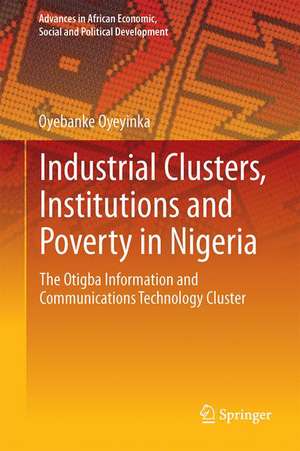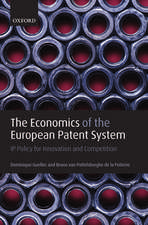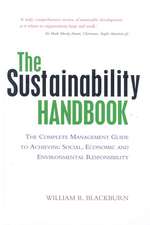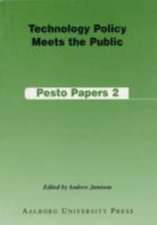Industrial Clusters, Institutions and Poverty in Nigeria: The Otigba Information and Communications Technology Cluster: Advances in African Economic, Social and Political Development
Autor Oyebanke Oyeyinkaen Limba Engleză Hardback – 9 feb 2017
| Toate formatele și edițiile | Preț | Express |
|---|---|---|
| Paperback (1) | 635.65 lei 43-57 zile | |
| Springer International Publishing – 12 iul 2018 | 635.65 lei 43-57 zile | |
| Hardback (1) | 641.85 lei 43-57 zile | |
| Springer International Publishing – 9 feb 2017 | 641.85 lei 43-57 zile |
Din seria Advances in African Economic, Social and Political Development
- 20%
 Preț: 562.78 lei
Preț: 562.78 lei - 18%
 Preț: 781.45 lei
Preț: 781.45 lei - 15%
 Preț: 648.56 lei
Preț: 648.56 lei - 15%
 Preț: 704.36 lei
Preț: 704.36 lei - 15%
 Preț: 640.71 lei
Preț: 640.71 lei - 15%
 Preț: 645.47 lei
Preț: 645.47 lei - 20%
 Preț: 552.24 lei
Preț: 552.24 lei - 18%
 Preț: 785.24 lei
Preț: 785.24 lei - 24%
 Preț: 694.97 lei
Preț: 694.97 lei - 15%
 Preț: 636.30 lei
Preț: 636.30 lei - 15%
 Preț: 647.08 lei
Preț: 647.08 lei - 18%
 Preț: 729.23 lei
Preț: 729.23 lei - 18%
 Preț: 891.33 lei
Preț: 891.33 lei - 18%
 Preț: 892.90 lei
Preț: 892.90 lei - 15%
 Preț: 654.43 lei
Preț: 654.43 lei -
 Preț: 391.40 lei
Preț: 391.40 lei - 15%
 Preț: 698.30 lei
Preț: 698.30 lei -
 Preț: 391.61 lei
Preț: 391.61 lei - 15%
 Preț: 642.68 lei
Preț: 642.68 lei - 18%
 Preț: 788.41 lei
Preț: 788.41 lei - 15%
 Preț: 584.43 lei
Preț: 584.43 lei - 15%
 Preț: 644.30 lei
Preț: 644.30 lei - 15%
 Preț: 642.51 lei
Preț: 642.51 lei -
 Preț: 389.88 lei
Preț: 389.88 lei -
 Preț: 432.88 lei
Preț: 432.88 lei - 15%
 Preț: 511.52 lei
Preț: 511.52 lei - 18%
 Preț: 995.83 lei
Preț: 995.83 lei - 18%
 Preț: 953.20 lei
Preț: 953.20 lei -
 Preț: 387.58 lei
Preț: 387.58 lei - 18%
 Preț: 894.34 lei
Preț: 894.34 lei - 15%
 Preț: 644.49 lei
Preț: 644.49 lei -
 Preț: 381.00 lei
Preț: 381.00 lei - 15%
 Preț: 698.62 lei
Preț: 698.62 lei - 15%
 Preț: 639.73 lei
Preț: 639.73 lei - 18%
 Preț: 897.65 lei
Preț: 897.65 lei - 15%
 Preț: 644.95 lei
Preț: 644.95 lei -
 Preț: 392.37 lei
Preț: 392.37 lei
Preț: 641.85 lei
Preț vechi: 755.13 lei
-15% Nou
Puncte Express: 963
Preț estimativ în valută:
122.82€ • 128.56$ • 102.22£
122.82€ • 128.56$ • 102.22£
Carte tipărită la comandă
Livrare economică 31 martie-14 aprilie
Preluare comenzi: 021 569.72.76
Specificații
ISBN-13: 9783319411491
ISBN-10: 3319411497
Pagini: 220
Ilustrații: VII, 190 p. 14 illus., 3 illus. in color.
Dimensiuni: 155 x 235 x 13 mm
Greutate: 0.46 kg
Ediția:1st ed. 2017
Editura: Springer International Publishing
Colecția Springer
Seria Advances in African Economic, Social and Political Development
Locul publicării:Cham, Switzerland
ISBN-10: 3319411497
Pagini: 220
Ilustrații: VII, 190 p. 14 illus., 3 illus. in color.
Dimensiuni: 155 x 235 x 13 mm
Greutate: 0.46 kg
Ediția:1st ed. 2017
Editura: Springer International Publishing
Colecția Springer
Seria Advances in African Economic, Social and Political Development
Locul publicării:Cham, Switzerland
Cuprins
1 Industrial Clusters, Institutions and Poverty in Nigeria.- 2 The Nexus of Industrial Clusters and Poverty.- 3 Living Standards and Industrial Clusters in Nigeria.- 4 Industrial Cluster Impact on Employment and Poverty: Analysis of Living Standards.- 5 Social Protection and Living Standards in Informal Industrial Clusters.- 6 The State, Institutions and Policy Support for Clusters.- 7 Conclusion: Industrial Clusters and Poverty.
Notă biografică
Oyebanke Oyeyinka is an Associate Consultant with Dalberg Global Development Advisors. She holds a PhD in Urban Planning from Columbia University where she focused on the political economy of development planning. Her doctoral thesis explored how industrial clusters help to improve the living standards of workers within them, using the case study of an Information and Communications Technology cluster in Lagos, Nigeria. She holds a masters degree in City Planning from the Massachusetts Institute of Technology, where she specialized in International Development. Her masters thesis tried to explain the penalty of poor infrastructure in developing countries exemplified by the high cost and low quality of service observed in the telecommunications industry. For her bachelor’s, she majored in Economics at Carleton College.
She has a chapter in the Urban opportunities: Perspective on climate change, resilience, inclusion and the informal economy published by theWilson Center. She has co-authored a book chapter for the African Development Perspectives Yearbook (Expected 2015), as well as the University for Peace Africa’s Programmes’ Confronting Africa’s governance and socio-economic challenges in the 21st century. She is broadly interested in industrial clusters, industrial and social policies, the informal economy, and the dynamics of poverty and inequality in developing countries. She has worked as an intern with the United Nations, and participated in ETH sustainability’s Youth Encounter on Sustainability.
She has a chapter in the Urban opportunities: Perspective on climate change, resilience, inclusion and the informal economy published by theWilson Center. She has co-authored a book chapter for the African Development Perspectives Yearbook (Expected 2015), as well as the University for Peace Africa’s Programmes’ Confronting Africa’s governance and socio-economic challenges in the 21st century. She is broadly interested in industrial clusters, industrial and social policies, the informal economy, and the dynamics of poverty and inequality in developing countries. She has worked as an intern with the United Nations, and participated in ETH sustainability’s Youth Encounter on Sustainability.
Textul de pe ultima copertă
This book provides a systematic examination of the relationship between industrial clusters and poverty, which is analyzed using a multidimensional framework. It examines the often-neglected concept of social protection as a means of mitigating the risks and vulnerabilities faced by workers and citizens in poor countries. By analyzing the case of the Otigba Information and Communications Technology cluster in Lagos, Nigeria, the author shows under which conditions firms in productive clusters can pass on benefits to workers in ways that improve their living standards in the wider socio-economic and spatial context of the region. The results presented provide substantial evidence of opportunities for economic development, helping planners to explore different avenues for integrating firm-driven social protection into social policy.
Caracteristici
Addresses the overlap between industrialization and economic development, industrial policy and social policy Highlights formal and informal institutions that govern the welfare of owners, workers and firms within industrial clusters Connects and analyses the living standards of urban workers within a multidimensional framework, providing unique methodological approaches for further research
















